Faculty News & Notes
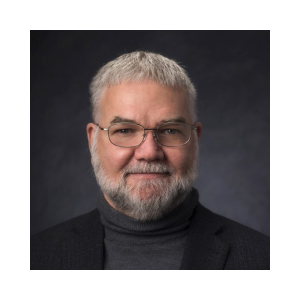
Robert Babcock
Alumni Distinguished Professor
This spring I had the great pleasure of teaching a newly created undergraduate Latin prose course focused on the Confessions of Augustine, and I had 13 talented and enthusiastic students in the class.
In November The Oxford Handbook of Latin Palaeography, which I co-edited with a colleague at Ohio State University, finally appeared—after a decade of blood, sweat, and tears. In addition to my editorial work on the volume, I also wrote two of the essays and translated seven of them, from German, Italian, French, and Spanish—the last in collaboration with Pablo Molina, UNC Classics, PhD 2016. I also published an essay on a twelfth-century scribe and poet, “The Scribal Verses of Waltherius in a Twelfth-Century Manuscript of Josephus,” in a volume entitled Between the text and the page (Toronto: Pontifical Institute of Mediaeval Studies, 2020). I struggled all year to continue my manuscript research without being able to visit manuscript libraries (but aided by the increasing number of digital scans of manuscripts available online); and I submitted to Harvard press the manuscript of an edition and translation of the complete works of Hrotsvit, a tenth-century Saxon nun, who was a prolific poet and playwright. That should appear late this year or next. This spring I had the great pleasure of teaching a newly created undergraduate Latin prose course focused on the Confessions of Augustine, and I had 13 talented and enthusiastic students in the class. I served as Director of Undergraduate Studies throughout the year, and am delighted to hand off that honor to Prof. Baragwanath on June 30th. Lastly, I reached a career milestone, being elected a Fellow of the Medieval Academy of America, a distinction conferred each year on three or four “scholars who have made notable contributions to the advancement of Medieval Studies”.
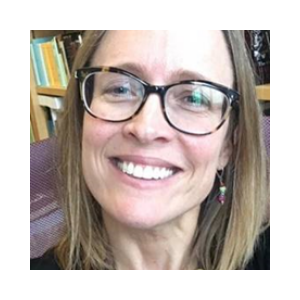
Emily Baragwanath
Associate Professor
This past academic year as a fellow at the National Humanities Center I worked on my monograph on the representation of women and their narrative and explanatory role across the works of the fourth-century Athenian writer Xenophon.
This past academic year as a fellow at the National Humanities Center I worked on my monograph on the representation of women and their narrative and explanatory role across the works of the fourth-century Athenian writer Xenophon. My hope is that the deeper understanding that emerges from Xenophon’s Women will serve as a corrective to the way Classicists have thought not only about this individual philosopher and historian, but about the role of gender in antiquity more broadly. I participated in a panel on the obligations of mentorship (you can watch it on the National Humanities Center website) and gave zoom guest lectures at UNC-G (‘Xenophon’s Women at Home: Female Virtue, Capacity, and Agency in Oeconomicus’) and Notre Dame (‘Xenophon’s Women In Context: The Entitlement Mindset, Sex, & Failing States in Hellenica’). I am also finishing writing the Introduction and Notes for a new Oxford World Classics volume of Xenophon’s Symposium and Estate Management (translation A. Verity). Otherwise, I have been taken up with supervising remote schooling and reading abstracts in my new role on the SCS Program Committee. Covid has delayed the panel on ‘Xenophon and Genre, Genres in Xenophon’ that Melina Tamiolaki (University of Crete) and I have organized in the framework of the Celtic Classics Conference (Lyon), as well as the Xenophon 2020 conference (which will now happen not in Liverpool but on zoom).
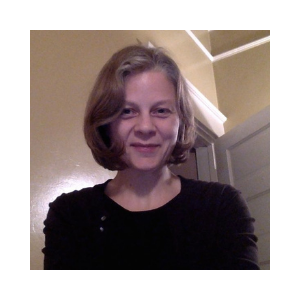
Janet Downie
Associate Professor
My outstanding Greek students persevered through a year of online meetings, working hard, learning a lot, and managing to create a community, in spite of everything. We all look forward to in-person reunions in the fall.
My outstanding Greek students persevered through a year of online meetings, working hard, learning a lot, and managing to create a community, in spite of everything. We all look forward to in-person reunions in the fall. In research, this unusual year has provided some valuable time for broad and deep reading. I have continued to make progress on my large-scale research project on The Hellenic Landscapes of Imperial Asia Minor, dealing with the representation of the space of Asia in a range of geographical, rhetorical and fictional texts from the first three centuries CE. The book project has been fueled by articles and papers along the way, including one on “Symbolic and Chronotopic Space: The Ephesus Episode in the Acts of the Apostles and the Apocryphal Acts of Paul,” which has just appeared in a volume edited by colleagues at the Center for Advanced Studies “Beyond Canon_” in Regensburg, Germany (The Apostles Peter, Paul, John, Thomas and Philip with their Companions in Late Antiquity, eds. Tobias Niklas, Janet Spittler and Jan Bremmer, Peeters Publishers 2021). In April my Penn State colleague Anna Peterson and I co-organized an international workshop on “Greek Literary Topographies of the Roman Imperial World,” which was successful, stimulating, and a starting point for ongoing collaboration. In May, my Université Laval colleague Anne-France Morand and I co-organized a bilingual panel for the annual conference of the Classical Association of Canada on “Espace géographique et espace littéraire/Geographical Space and Literary Space.” One positive long-term outcome of the pandemic experience will be the possibility to continue some workshops and reading groups at a distance. This year I have enjoyed being able to read and discuss literature with far-flung colleagues, students, and friends in French and in Greek, modern and ancient.

Al Duncan
Assistant Professor
Reading and teaching about ancient plagues only does so much to prepare one for living through a modern pandemic. Nevertheless, over the past year I often found myself appreciating the broad historical perspective (and humane consolation) of the Classics while teaching and researching remotely and raising kids (Alex, 6, and Dashiell, 2) at home.
Reading and teaching about ancient plagues only does so much to prepare one for living through a modern pandemic. Nevertheless, over the past year I often found myself appreciating the broad historical perspective (and humane consolation) of the Classics while teaching and researching remotely and raising kids (Alex, 6, and Dashiell, 2) at home.
Early in the pandemic the public was particularly hungry to have an ancient perspective on this ‘unprecedented’ happening. At a Carolina Public Humanities ‘Virtual Happy Hour’ in April, I talked about Greek theater in times of crisis, and in May gave my first radio interview on the Aaron Keck Show (on Chapelboro 97.9) on the impact of the Athenian plague (431–429 BCE) on Greek drama and its legacy. An upshot of these public meditations? Tragedy and pandemics are both good at showing that our sufferings are rarely unique and that we never suffer alone.
Later in the summer I participated alongside Professor Suzanne Lye (always an innovator in the classroom!) in a workshop organized by UNC’s Digital and Lifelong Learning team to transform existing classes for remote instruction. In my case, the course was CLAS 263 ‘Athletics in the Greek and Roman World,’ a high-enrolling lecture which, before the pandemic, had included a practicum in which students recreated ancient athletic events — not exactly public-health-friendly activities during a pandemic! This training proved helpful more broadly when, two weeks into the Fall semester, the university veered toward the ‘off-ramp’ of remote instruction so that all of my classes this year, from my graduate seminar and advanced undergraduate courses on Aristophanes to my first-year seminar, Greek Drama from Page to Stage, were likewise convened online.
Like so many other instructors, I was compelled when teaching online to confront both new and longstanding issues of accessibility and equity. I was heartened to hear from so many of my students that their instructors in the Classics Department, faculty and graduate students alike, had excelled in rising to the unique pedagogical challenges of the moment to become compassionate and innovative presences in the digital classroom. I look forward to continuing with some of the pedagogical approaches and platforms adopted this year (e.g., short video submissions via FlipGrid, collaborative use of the Google productivity suite, etc.) even as I am eager to return to the familiar immediacy of the brick-and-mortar classroom.
Despite working remotely, my research continued apace thanks to the hard work of the university’s librarians. While I was disappointed not to gather with old friends at the SCS Chicago, I was grateful to co-present a panel on ‘New Approaches to Spectatorship” with my colleague, Anne-Sophie Noel (ENS Lyon). In my paper I discussed the intersubjective aesthetics of theater via a process I call ‘deliberative spectatorship’ — an outgrowth of my ongoing research into cognitive approaches to Greek drama. But one doesn’t need to be au courant with neuroscientific discoveries to realize, as we’ve all experienced this year, that ‘seeing’ others in person is far more than a narrowly visual experience. The pandemic has thus leant not only new perspective, but also new urgency to my work exploring the materiality and phenomenology of the ancient stage and their effects on modern receptions of Athenian drama.
As we begin to hope for a return to a new normal, I wish to express my gratitude to my students and colleagues in the department, and in particular to Professor Donald Haggis, as Chair, and our office staff, Cinnamon Weaver and Kim Miles, for keeping things going during this tumultuous year. I look forward to seeing everyone back in Murphey Hall again before long.
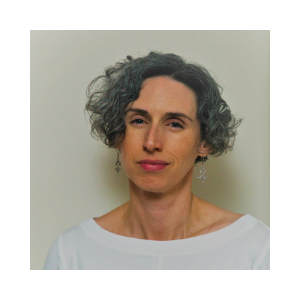
Jennifer Gates-Foster
Associate Professor
Gates-Foster’s notes coming soon!
Work in progress

Sharon James
Professor
Like everybody else, I’m grateful to have been able to keep teaching via Zoom in this unprecedented year, though I hope we never have to do so again.
Like everybody else, I’m grateful to have been able to keep teaching via Zoom in this unprecedented year, though I hope we never have to do so again. I’m also grateful that my husband and I are safely vaccinated, as are our families. I’m especially grateful to my students, who remained gallant and game all year, forging ahead with research and learning under stressful circumstances.
My big departmental project of the year was to run our Working Group in Classics, Diversity, Equity, Inclusivity, and Black Lives Matter. We’ve been researching relevant campus and departmental history—often very somber matters—and thinking about the future of Classics, Classical Archaeology, and the department. It has been challenging work, but very rewarding and eye-opening. I look forward to continued learning next year.
As the Chair’s message noted, I was honored this year with the 2021 Board of Governors Teaching Award for the UNC Chapel Hill campus. I’m still in a state of surprise, but I take the award as an indication that students appreciate the kind of lively, challenging, exciting courses this department offers, and I hope it will bring a few more interested parties into Murphey when we start teaching again in August.
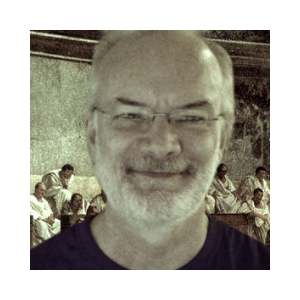
Jim O’Hara
George L. Paddison Professor of Latin
My goals for the year were to survive and stay sane: I think I did OK. Big beard, long hair, and some extra weight in the Fall, all trimmed now. In the Fall I taught for the first time the large lecture course “The Romans”: interesting to teach my largest class ever and have it be online. I did enjoy offering the students a different Zoom background each day for all my courses:
My goals for the year were to survive and stay sane: I think I did OK. Big beard, long hair, and some extra weight in the Fall, all trimmed now.
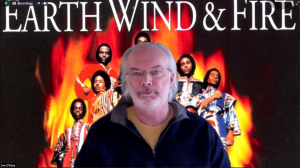
In the Fall I taught for the first time the large lecture course “The Romans”: interesting to teach my largest class ever and have it be online. I did enjoy offering the students a different Zoom background each day for all my courses: ancient or modern art on classical myths, modern tv or film like Jack Nicholson in The Shining for Neoptolemus breaking through the door in Aeneid 2, Hercules in art and cartoons, the ghost of Homer (Simpson), an album cover from Earth Wind and Fire (the elements in Lucretius), the Flintstones (early man), Clarence Darrow and Perry Mason (no one had heard of him!) and Elle Woods for a Roman law session, Julie Andrew for Lucretius (both “Nothing Comes from Nothing” and “A Spoonful of Sugar”), dementors for the soul leaving the body in Lucretius, Bill and Ted Playing Battleship with Death, etc.
I gave the keynote address, “Evander’s Stories of Blood and Gore: New Ways to Read Vergil,” via Zoom for the Virginia Junior Classical League in April, and in March taught a special two-session Lucretius class online for adults for Carolina Public Humanities.

I continue to work co-editing, with Randall Ganiban, the Focus-Hackett classroom commentary on Aeneid 7-12, written by a team of six, which we hope will be out soon, and in June 2021 will give a paper “Adventures in writing and editing a group classroom commentary: the Focus-Hackett Aeneid project” in a conference on “Early Modern and Modern Commentaries on Virgil” that was supposed to be in person in Rome in June 2020 but has to be online a year later.
Work continues on my book Teaching, Pretending to Teach, and the Authority of the Speaker in Roman Didactic and Satire. I have two articles in progress related to that project, one on Horace’s Ars Poetica, another on Lucretius (“What Are Lucretius’ Goals? How Do We Know?”). I’ll work on the book this summer, while teaching a seminar on it in the Fall, and when on leave next Spring. I published one book review, of Bobby Xinyue and Nicholas Freer (eds.). Reflections and new perspectives on Virgil’s Georgics (Bloomsbury, 2019).
My former Ph.D. students have been more productive, and are having a good run: 2020 saw the appearance of Ted Gellar-Goad’s Laughing Atoms, Laughing Matter: Lucretius’ De Rerum Natura and Satire, and 2021 Chris Polt’s Catullus and Roman Comedy: Theatricality and Personal Drama in the Late Republic; in 2021 Tedd Wimperis’ manuscript Constructing Communities in Vergil’s Aeneid: Cultural Memory, Identity, and Ideology was accepted for publication by Michigan. Andrew Ficklin defended his dissertation “Venus’ Other Son: The Figure of Cupid in Augustan Literature and Art,” right as exams were happening in the Spring. Two other students are starting dissertations with me now.
I continue as director of the Post-Baccalaureate Program, which is smaller now than in the past but still serves its purpose.
June 2021 marks my virtual 40th reunion from Holy Cross, where I was of course a Classics major, as Dr Anthony Fauci has been twenty years before: if my 40th and his 60th had been in person, would he have been there?
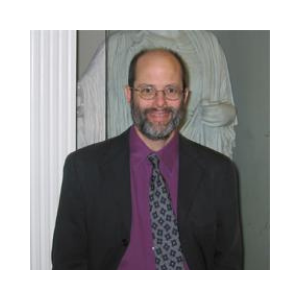
James B. Rives
Kenan Eminent Professor of Classics
Although the past year and a half certainly had its challenges, I’m glad to be able to report that I am faring remarkably well. Unlike many people, I was able both to keep my job and to do it remotely, neither I nor anyone close to me contracted Covid-19, and John and I have now been fully vaccinated for about two months. So there is much for which we are grateful.
Although the past year and a half certainly had its challenges, I’m glad to be able to report that I am faring remarkably well. Unlike many people, I was able both to keep my job and to do it remotely, neither I nor anyone close to me contracted Covid-19, and John and I have now been fully vaccinated for about two months. So there is much for which we are grateful. We’re especially grateful that we were in our new house during the quarantine. We had moved in at the very end of May 2019, so by the time everything ground to a halt in March 2020 we were well and truly settled. The house has enough different spaces that John and I didn’t crowd each other, and it has plenty of light and views to the trees in our back yard, so that we never felt confined. Best of all, it has a large screened porch that allowed us to have socially-distanced meals or drinks with small numbers of friends; we knew when John designed the house that we would enjoy the porch, but we never anticipated that it would become essential to our ability to socialize!
One of the challenges of the year was of course teaching, since like so many other people I taught all my classes online, something completely new to me. Most of my classes were small seminars or language classes: a graduate course on Suetonius in the fall, and in the spring fourth-semester Greek New Testament and the Junior Seminar, which I taught on my research topic of animal sacrifice. I was able to teach all these courses more or less the same way that I would normally teach them in the classroom, with some adjustments to assignments. The Junior Seminar in fact in some ways benefited from the Zoom format, since it made it much simpler for me to invite colleagues from other institutions to make guest appearances and talk about their research, something that the students really enjoyed (as did I!). My large lecture on Classical Mythology, however, which I taught in the fall, was a different story. I realized early on that it would simply not be feasible to manage 160 students in a live online lecture, even with the help of three TAs, and so I decided to teach it in an entirely asynchronous format, with pre-recorded lectures. I had no idea how to make this work for the students, but fortunately my senior TA, Rachael Tobin-Dodd, had had training in asynchronous course design; she was able both to help me come up with effective assignments and to create a very user-friendly course site. Although it was a huge amount of work, the student evaluations indicated that it was a success. And some of the assignments and strategies were so effective that I’ve decided to retain them the next time I teach the course in the classroom.
In terms of supervision, I was proud that two of my PhD students were able to overcome all the obstacles of doing research during the pandemic and to finish their dissertations: Nathan Smolin on ‘Christ the King: Roman Emperor and Christian Theology in the 4th Century AD’ and Emma Warhover on ‘Humor in the Historical Works of Tacitus’. It was a great pleasure to work with both of them, and from both I learned a lot.
In terms of my own research, most of what I have to report is in the future rather than the past tense. The last of my papers already in the course of publication, on the role of animal sacrifice in the Roman persecution of Christians, appeared in an edited volume from Cambridge University Press. I co-hosted with our grad student Elizabeth Needham a departmental discussion on the history and future of Classics as a discipline; you can find the text of the short presentation that I gave, on the genealogy of the term ‘Classics’ as the name of an academic discipline, on our website. In April I gave a Tea Talk on reading the Gospel of Mark as a post-classical text, a project to which I hope to return in the future. But before that I have more immediate plans. First, there are several upcoming conferences: one in October in South Africa (in which I’ll participate virtually), one next April in New York, and one next May in Seville, both of which I hope to attend in person. The New York conference is on the late Republican Roman scholar Nigidius Figulus, but in both the others I’ll present papers on aspects of animal sacrifice, the main focus of my research for many years now. And that brings me to the most important of my plans: I have had the great good fortune to be awarded research leave for next year: a UNC-Chapel Hill Senior Faculty Research and Scholarly Leave and a Loeb Classical Library Foundation Fellowship together allow me to focus full-time on research for an entire academic year. My plan is to draft a book on animal sacrifice in the Roman empire, pulling together all the piecemeal work that I’ve done on that for some dozen years. So watch this space! I hope to have more to report next year.
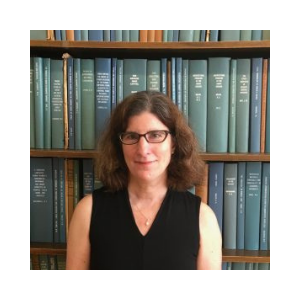
Patricia Rosenmeyer
George L. Paddison Professor of Classics
For all of us, 2020-21 has been a year like no other. When I left town for Spring Break in March 2020, I had no idea that I wouldn’t be back in the classroom, or even in Chapel Hill, for more than a year. As much as we all grew to dislike Zoom, it was a valuable link for sustaining our intellectual and social community in Murphey Hall.
For all of us, 2020-21 has been a year like no other. When I left town for Spring Break in March 2020, I had no idea that I wouldn’t be back in the classroom, or even in Chapel Hill, for more than a year. As much as we all grew to dislike Zoom, it was a valuable link for sustaining our intellectual and social community in Murphey Hall.
I feel very lucky to have been able to teach two new graduate courses in fall 2020 online, with no reduction in engagement and enthusiasm on the part of the students. The first course, CLAS 720: Methods, Resources, and Perspectives in Classical Scholarship, was designed collaboratively and is now required for all M.A. students. It provides an overview of the field, and introduces resources and methods to help students to conduct their own research in an informed fashion. Visiting speakers included departmental colleagues as well as Prof. Patrice Rankine (Univ. of Richmond), who facilitated a great discussion of Black Classicisms based on his current work. Teaching this class reminded me of all the wonderful topics collected under the umbrella of Classical Studies, from the very technical (e.g. paleography, papyrology, textual criticism) to the material (e.g. gendered viewing of sculpture, New Materialisms) to the highly theoretical (e.g. intertextuality, narratology, etc). I also taught a graduate seminar, GREK 910: Sappho and her Receptions, covering the complete poetic corpus of Sappho, as well as her reception in antiquity and beyond. The goal of this seminar was to provide students with a solid sense of Sappho’s poetry, her biography, and aspects of her reception. Topics were tailored to the interests of the students enrolled, such as Roman receptions (e.g. Catullus, Ovid), Early Modern receptions, and the recent new papyri along with the complex ethical issues surrounding their publication. I really enjoyed this deep dive into the world of 7th c. BCE Lesbos, and the students all produced sophisticated and scholarly final research papers.
Spring 2021 was dedicated to a research leave, and in addition to working on a commentary on Sappho aimed at undergraduates, and publishing a book review in JHS (M. Biraud and Z. Zucker, eds., The Letters of Alciphron: A Unified Literary Work? ), I found myself frequently on Zoom. I was part of a panel at the SCS Annual Meeting in January on Greek Imperial poetry, and presented a paper on “Latin, Greek, and Bilingual Verse Inscriptions” for a MAPPOLA workshop based in Vienna in February. In May, I chaired a session with our institutional partners in Tübingen University on “Teaching Classics in a Pandemic Time”, and spoke on “Julia Balbilla and Sappho” for an online workshop organized by Tim Whitmarsh on “Greek Poetry in the Roman Empire”. In June, I gave a paper on “Sacred and Secular in Sappho” for the International Society for the Study of Lyric Annual Conference in Leuven. But my biggest challenge this spring was an international workshop that I co-organized with a colleague in Israel that had been postponed in 2020 because of the pandemic, and finally came to fruition in May 2021 online: “Modern Jewish Receptions of Classical Antiquity”, including speakers from Israel, the US, and the UK. The three-day event took place during the recent escalation of hostilities between Israel and Gaza, heightening the importance of having our workshop involve both Arabic and Hebrew receptions of Homer and Vergil, presented by both Jewish and Palestinian scholars. My own paper was “After Lights Out: Studying the Classics in a WWII Internment Camp”. We plan to publish the proceedings of the conference.
Most opportunities for travel and in-person collaboration were lost this past year, and several publications were delayed as well. I postponed my 6-week stay in London as a Tarrant Fellow at the Institute for Classical Studies until next year, as well as a trip to see my collaborator in an upcoming COIL (collaborative Online International Learning) course; but I am on the books as a Visiting Professor at the Universidade de Sao Paulo, Brazil for fall 2021, alas only in spirit. I very much look forward to returning in person to Murphey Hall in August.
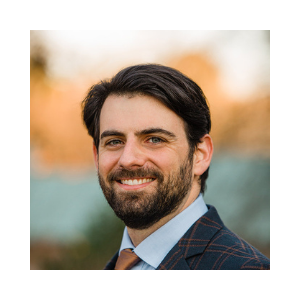
Timothy Shea
Assistant Professor
Welcome to new Assistant Professor Timothy Shea.
I was born and raised in southern Louisiana and stayed close to home to pursue bachelor’s degrees in Greek and Latin at Tulane University in New Orleans.
I was born and raised in southern Louisiana and stayed close to home to pursue bachelor’s degrees in Greek and Latin at Tulane University in New Orleans. After, I moved to the Triangle, where I completed a PhD. in Greek Art and Archaeology at Duke University. A foundational part of my training as a Classical Archaeologist was the time I spent in the field working on archaeological excavations in Greece and Italy. My time at the Azoria Excavations in East Crete under the direction of my colleague Donald Haggis was particularly formative. Upon completing my PhD, I led a study abroad trip to Greece for Dartmouth College and taught courses at Florida State University and Duke University. Spring 2021 was my first semester at UNC Chapel Hill, and I was very impressed with the resilience of the undergraduate and graduate students in my courses.
My research spans a wide variety of topics in Greek art and archaeology. My current book project, Death and Diplomacy: Citizens and Immigrants in Classical Athenian Cemeteries, explores the ways immigrants living in democratic Athens chose to represent themselves in cemeteries and considers why certain immigrant communities were privileged over others. Additionally, I am studying material from the Archaic portion of the settlement at Morgantina in Sicily with one of the site’s directors, Carla Antonaccio, Professor Emerita at Duke University. As part of a long-term collaborative project, I also have the privilege of working on portrait sculpture from the Athenian Agora Excavations with a team of researchers under the direction of Sheila Dillon at Duke University.
In my first semester at UNC-Chapel Hill, I taught courses on Archaic Greek Sculpture and Greek Topography. In both cases, students did amazing work, especially when considering their management of difficult circumstances that going to a university during a global pandemic naturally entails. My colleagues in Classics have been so welcoming in my short time here, and I look forward to returning to campus in the fall and meeting everyone in person.
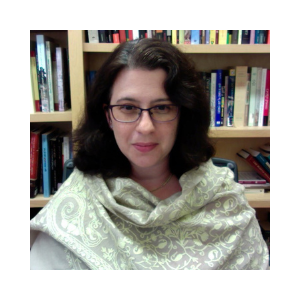
Hérica Valladares
Assistant Professor
Now that summer is here and many of us have been vaccinated, life is beginning to look and feel a bit more normal. Still, when I think back to how we have lived and worked for the past fifteen months, I’m astounded at our collective resilience. I’m also amazed by and deeply grateful for our department’s close-knit and supportive community.
Now that summer is here and many of us have been vaccinated, life is beginning to look and feel a bit more normal. Still, when I think back to how we have lived and worked for the past fifteen months, I’m astounded at our collective resilience. I’m also amazed by and deeply grateful for our department’s close-knit and supportive community.
This past year, I taught two new undergraduate lecture courses in Classical Archaeology: “Life in Ancient Pompeii” (CLAR 380) and “Roman Archaeology” (CLAR 247), which Jen Gates-Foster had taught for several years with great success prior to her most recent research leave. Although I had already taught a first-year seminar on Pompeii at UNC, last fall was the first time that I offered this course as a gen-ed lecture for close to 100 students. A Large Course Redesign Grant from the Center for Faculty Excellence greatly helped me in the process of restructuring the materials I already had to fit this new pedagogical format. But most importantly, this grant allowed me to hire our wonderful graduate students, Katie Tardio and Jackson Miller (who were also the TAs for CLAR 380) as research assistants during Summer 2020. Katie and Jackson created fabulous posters for this course and pushed me to design more creative writing assignments, which the students loved. They also helped me update readings for this class, as we developed new units on the archaeology of slavery and ancient literacy. Together, we navigated the challenges of teaching over Zoom for a full semester for the very first time and created a course that was accessible and engaging for all our students.
I really loved teaching “Roman Archaeology” in the spring. For this course, I was assisted by another stellar team of TAs: Emily Lime and Cole Warlick. Emily and Cole gave splendid guest lectures on key topics such as domestic architecture in Campania, Pompeian gardens, Trajan’s arch at Benevento, and agricultural production on the Bay of Naples. At a moment when we were all approaching total Zoom burnout, Emily and Cole were indefatigable in guiding and supporting our students through one of our most difficult semesters yet. They were also undaunted in conquering all the newfangled technology needed to run this course asynchronously. It is no exaggeration to say that I could not have done this without them.
I also taught two graduate-level courses this year: a graduate seminar on the Roman House in the fall and a survey of Roman Painting in the spring. As usual, I was impressed by the intellectual sophistication of our students and their generosity with one another. For me, one of the highlights of teaching Roman Painting was sharing chapters from my new book with my students. After many years of labor, Painting, Poetry and the Invention of Tenderness in the Early Roman Empire was published by Cambridge University Press in January 2021. It was recently reviewed both in Hyperallergic and BMCR.
On the professional front, I have two more bits of news to share: in late March, I was promoted to the rank of Associate Professor. I could not be happier with this outcome. I am profoundly grateful to my colleagues at UNC who have been unfailingly supportive of me and my family since we arrived here in 2015. Next fall, I will take a break from teaching so I can focus on my next book project, whose provisional title is Fashioning Empire: Roman Women and Their Objects. From August to December, I will be a fellow at UNC’s Institute for the Arts and Humanities. If you would like to learn more about my new project, please check out my interview with Philip Hollingsworth.